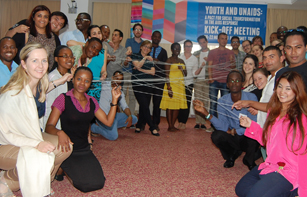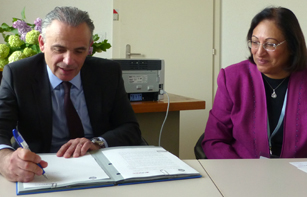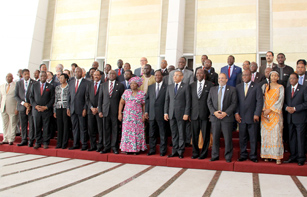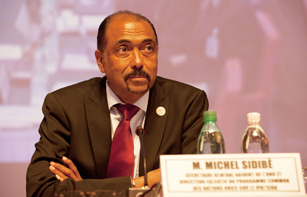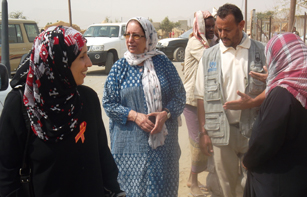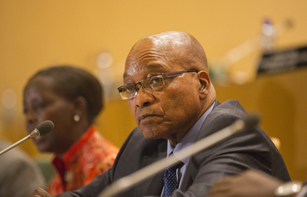
South Africa’s President Jacob Zuma at the New Partnership for Africa’s Development meeting held on the side-lines of 20th African Union Summit in Addis Ababa, Ethiopia on 26 January 2013. Credit:UNAIDS/J.Ose
South Africa’s President Jacob Zuma called on African leaders to effectively deal with HIV and as such eliminate one of the main causes of maternal deaths on the continent.
Addressing the Campaign for Accelerated Reduction of Maternal Mortality in Africa (CARMMA), President Zuma was one of more than 15 Heads of State and policy makers who participated in the High-Level Meeting. The African leaders reviewed past successes and future opportunities for reducing maternal and child mortality in Africa.
“HIV still contributes to about 40% of maternal and child deaths in South Africa. This means that unless we deal decisively with HIV we will not be able to reduce maternal and child mortality to any significant extent,” said President Zuma.
He declared that the extent of the HIV epidemic and decreasing donor funding makes it imperative for Africa to develop its local capacities to produce antiretrovirals for HIV treatment as well as male and female condoms.
“We need to ensure that we can sustain the gains that we have made as reported in the 2012 Global AIDS Report prepared by the UNAIDS, and that we are able to expand access to commodities like condoms and medicines and antiretrovirals,” underscored President Zuma.
Speaking alongside President Zuma, the outgoing Chair of the African Union and President of Benin, Dr Thomas Boni Yayi said thanks to incredible leadership, African countries have turned the story of AIDS from tragedy to hope.
Dr Boni Yayi said “breakthroughs in prevention and treatment have been rolled out, contributing to achievements in several countries.” But he said, “Despite these gains, AIDS is far from over and complacency and competing priorities meant that “we must remain vigilant and committed today, more than ever”.
HIV still contributes to about 40% of maternal and child deaths in South Africa. This means that unless we deal decisively with HIV we will not be able to reduce maternal and child mortality to any significant extent.
Jacob Zuma, South Africa’s President
Benin’s President also pointed to the initiative Roadmap on Shared Responsibility and Global Solidarity, adopted by the African Union in July 2012 as a response to the challenge. “Our Roadmap on Shared Responsibility and Global Solidarity is a new course for our Continent’s response to AIDS, TB and malaria,” said Dr Boni Yayi. “It optimizes the returns from AIDS investments, boosts capacity on the African continent to manufacture essential quality-assured medicines, strengthens mutual accountability and enhances governance.”
According to the World Health Organization’s report, “Trends in Maternal Mortality”, Africa has reduced maternal mortality by 41% and mortality of children under the age of five by 33% between 1990 and 2010.
The Chairperson of the African Union Commission, Dr Nkosazana Dlamini-Zuma emphasized that as Africa celebrates its progress, it must also reassess the persistent challenges to find comprehensive solutions. “We need to adopt an integrated approach to reducing maternal, new-born and child mortality within the overall continuum of care,” she said. “The impact of our combined efforts shall be much greater than the sum of our individual efforts.”
In May 2009, the Conference of Africa Union Ministers of Health launched CARMMA under the theme of “Universal Access to Quality Services: Improve Maternal, Neonatal and Child Health”; with the slogan “Africa cares; no woman should die giving life.” 37 countries have implemented the initiative at a national level, galvanising high level political commitment, country ownership, and social mobilization for maternal, new-born and child health issues in Africa.
The meeting took place on the side-lines of the 20th African Union Summit held in Addis Ababa, Ethiopia where the United Nations Secretary-General Ban Ki-moon addressed the opening.
Ending AIDS in Africa
Mr Ban commended the incredible leadership that enabled Africa to make tremendous progress in reducing new HIV infections and AIDS-related deaths. He said the progress was due to “good policies, strong leadership and global partnerships as well as scientific advances,” and he added, “The UN will continue to support you as we work for an AIDS-free generation, especially by ending HIV in new-borns.”
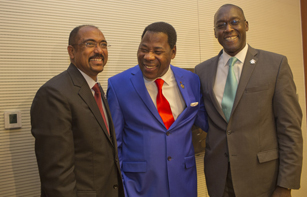
UNAIDS Executive Director Michel Sidibé meets with President of Benin, Dr Thomas Boni Yayi, and Vice President, Africa, World bank, Makhtar Diop, at the 20th African Union Summit in Addis, 27 January 2013. Credit: UNAIDS/J.Ose
Africa has made remarkable progress in the AIDS response. According to the UNAIDS World AIDS Day 2012 Report, new HIV infections dropped by 50% in 13 countries across Africa. The number of children newly infected with HIV, in sub-Saharan Africa fell by 24% between 2009 and 2011.
While acknowledging Africa’s gains towards the Millennium Development Goals (MDGs), Mr Ban raised his concerns over the remaining challenges. “I am still concerned about the hundreds of millions of Africans living in poverty,” said Mr Ban. “We must accelerate our efforts as we near the 2015 deadline.”
He called on African leaders to participate in the Special Event on the Millennium Development Goals at the United Nations General Assembly in September 2013, where world leaders convene to deliberate on MDG targets and the Post 2015 development agenda.
Delivering on Africa’s commitments
The opening of the AU Summit was preceded by the NEPAD Heads of State and Government Orientation Committee (HSGOC) Meeting. Addressing the meeting, NEPAD’s Chief Executive Officer Dr Ibrahim Mayaki stressed the need for continued advocacy for mutual accountability and the fulfilment of past commitments by development partners in Africa. “We are engaging the African Union Commission and UNAIDS on an Accountability report to combat HIV and AIDS, Tuberculosis and Malaria under the G8-Africa framework for 2013,” said Dr Mayaki.




